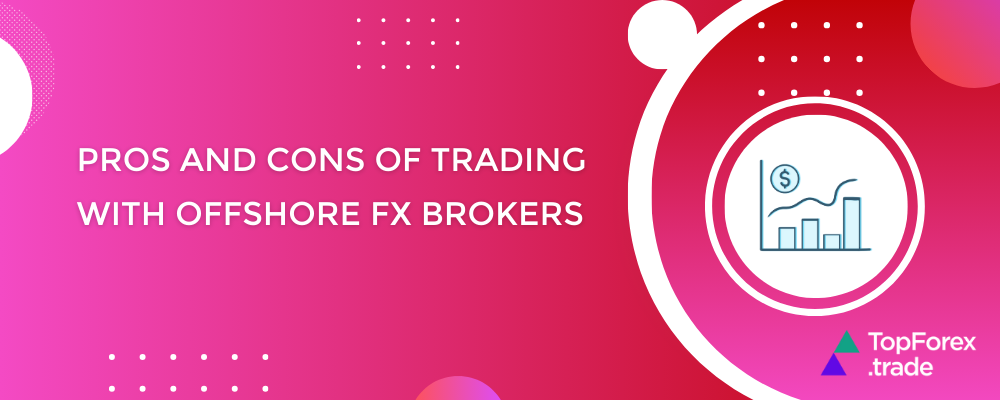Should you trade with offshore brokers? Key benefits and dangers

Trading in financial markets has become increasingly accessible, with brokers operating from various jurisdictions worldwide. Offshore brokers – those based in countries with different regulatory environments than the trader’s home country – offer both advantages and risks. While some traders seek offshore brokers for better leverage, lower fees, or access to specific markets, others are wary of potential regulatory and security concerns. This article explores the key pros and cons of trading with offshore brokers.
Pros of trading with offshore brokers

1. Higher leverage
Many offshore brokers offer significantly higher leverage than brokers in stricter regulatory jurisdictions like the U.S. or EU. For example, while U.S. brokers are limited to 1:50 leverage on forex for retail traders, offshore brokers may offer 1:500 or even 1:1000, allowing traders to control larger positions with less capital.
➡ Check out: Forex trading with leverage and margin explained
2. Lower trading costs
Offshore brokers often have lower fees, tighter spreads, and fewer restrictions on trading strategies (such as scalping or hedging). This can be appealing to active traders looking to maximize profits.
3. Access to global markets
Some offshore brokers provide access to markets or instruments that may be restricted in a trader’s home country, such as certain cryptocurrencies, exotic forex pairs, or international stocks.
4. Fewer regulatory restrictions
Strict regulations in countries like the U.S. and the UK can limit trading flexibility. Offshore brokers, particularly those in jurisdictions like the Cayman Islands or Vanuatu, may have fewer restrictions, allowing for more aggressive trading strategies.
5. Tax advantages
Depending on the broker’s location, traders may benefit from tax-friendly policies, such as no capital gains tax or reduced reporting requirements.
Cons of trading with offshore brokers

1. Lower regulatory oversight
Many offshore brokers operate under lax regulations, increasing the risk of fraud, manipulation, or unethical practices. Unlike brokers regulated by the FCA (UK) or CFTC (U.S.), offshore brokers may not offer the same level of fund protection.
2. Risk of scams and broker insolvency
Some offshore brokers have been involved in scams, refusing withdrawals, or manipulating prices. If a broker goes bankrupt, traders may have little to no legal recourse to recover their funds.
➡ We also recommend reading: How to verify if a Forex broker is legitimate (regulation check)
3. Limited deposit insurance
Brokers in well-regulated jurisdictions often provide investor protection (e.g., up to £85,000 under FCA rules). Offshore brokers rarely offer such guarantees, leaving traders vulnerable to losses.
4. Potential banking challenges
Some banks and payment processors may block transactions to offshore brokers, making deposits and withdrawals difficult. Additionally, traders may face scrutiny from tax authorities if using offshore accounts.
Bottom line: should you trade with an offshore broker?

The decision to trade with an offshore broker depends on your risk tolerance, trading goals, and experience level. If you prioritize high leverage, lower costs, and fewer restrictions, an offshore broker might be appealing, especially if you’re an experienced trader who can navigate potential risks. However, if safety, regulatory protection, and fund security are your top concerns, sticking with a well-regulated broker in your home country is the wiser choice.
Before choosing an offshore broker, thoroughly research its reputation, regulatory status (if any), and withdrawal policies. Always start with a small deposit to test reliability, and avoid brokers with a history of complaints or withdrawal issues. If you’re unsure, consider a hybrid approach: use a regulated broker for most of your capital and an offshore broker only for specific strategies requiring higher leverage.
Reliable, regulated brokers (multi-jurisdiction oversight)
If security and regulation are your top priorities, consider these well-regulated brokers, licensed by multiple financial authorities:
XM Group
- Regulated by: CySEC (Cyprus), ASIC (Australia), FSC (Belize), DFSA (Dubai)
- Known for low spreads, flexible leverage, and strong customer support.
AvaTrade
- Regulated by: Central Bank of Ireland, ASIC, FSCA (South Africa), FSA (Japan), ADGM (Abu Dhabi)
- Offers automated trading solutions (MetaTrader, AvaTradeGo) and strong educational resources.
eToro
- Regulated by: FCA (UK), CySEC, ASIC, FinCEN (USA for CFDs)
- Best for social trading, copy trading, and crypto investing.
Risk disclaimer: eToro is a multi-asset platform which offers both investing in stocks and cryptoassets, as well as trading CFDs.
CFDs are complex instruments and come with a high risk of losing money rapidly due to leverage. 51% of retail investor accounts lose money when trading CFDs with this provider. You should consider whether you understand how CFDs work, and whether you can afford to take the high risk of losing your money.
This communication is intended for information and educational purposes only and should not be considered investment advice or investment recommendation. Past performance is not an indication of future results.
Copy Trading does not amount to investment advice. The value of your investments may go up or down. Your capital is at risk.
Don’t invest unless you’re prepared to lose all the money you invest. This is a high-risk investment and you should not expect to be protected if something goes wrong. Take 2 mins to learn more.
eToro USA LLC does not offer CFDs and makes no representation and assumes no liability as to the accuracy or completeness of the content of this publication, which has been prepared by our partner utilizing publicly available non-entity specific information about eToro.
OANDA
- Regulated by: CFTC/NFA (USA), FCA (UK), ASIC (Australia), IIROC (Canada), MAS (Singapore)
- Trusted for forex trading with transparent pricing and strong institutional backing.
HF Markets (HFM)
- Regulated by: FCA (UK), CySEC, FSCA, DFSA, FSA (Seychelles)
- Popular for low-cost trading, high leverage on offshore entities, and fast execution.
Related articles:
Trading with offshore brokers - FAQ